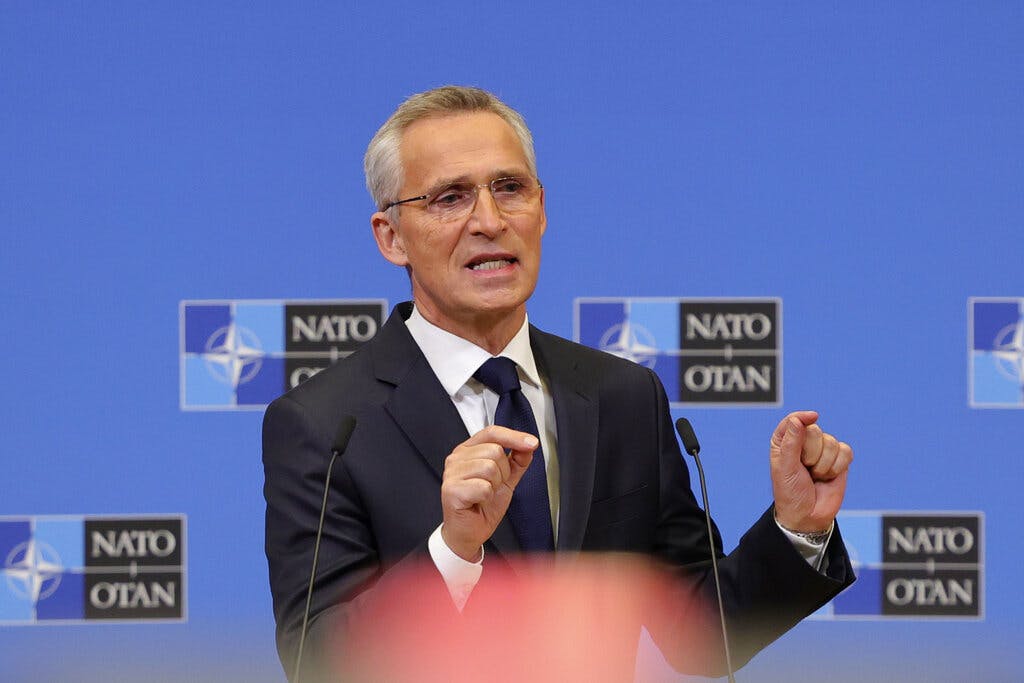NATO Secretary General To Address Growing Disillusionment in the Alliance
A growing number of American leaders are pushing for treaty members to be ‘allies,’ not ‘clients,’ of the nation’s pocketbook.

The secretary general of the North Atlantic Treaty Organization, Jens Stoltenberg, will take the podium Thursday at the alliance’s headquarters at Brussels to deliver an annual report for 2023 that is sure to draw attention at Washington, where some factions in Congress are increasingly questioning the alliance’s role.
Mr. Stoltenberg, in his remarks last year, lauded the “steely resistance of the Ukrainian people” and “unprecedented support for Ukraine” from NATO allies. He said that the accession to the treaty of Finland and Sweden underscores that “NATO’s door remains open.”
Calls have been growing, though, to discipline member states that are failing to meet their defense spending targets. Mr. Stoltenberg and the rest of NATO leadership will now have to contend with growing skepticism about America’s role in providing a blanket of security to European allies as new threats arise in East Asia.
The war in Ukraine has sparked what Mr. Stoltenberg has called an “unprecedented rise” in defense spending across European and Canadian allies. He projects that in 2024, 18 allies will spend at least 2 percent of their gross domestic product on defense, an improvement from 2014, when only three hit that baseline expectation.
Critics say that growth is insufficient in light of the alliance’s reliance on the American protectorate. The United States devotes $860 billion, or 3.49 percent of its GDP, to NATO — double the rate European allies and Canada contribute from their GDPs combined, the organization reports.
American leadership has long complained about the imbalance of international commitments to NATO. Even President Kennedy in 1963 told his National Security Council that “we cannot continue to pay for the military protection of Europe while the NATO states are not paying their fair share.” Now, though, the calls to defund NATO are growing at Washington.
President Trump threw a spotlight on the issue when he asserted at a campaign rally last month, “If they’re not going to pay, we’re not going to protect. Okay?” Although many Republicans do not support abandoning American commitments to the treaty altogether, Mr. Trump’s push for a system of self-reliance rather than an interdependent global order is gaining support in Congress.
“The question each European nation needs to ask itself is this: are you prepared to defend yourself?” Senator Vance wrote in a Financial Times op-ed last month. “And the question the US must ask is: if our European allies can’t even defend themselves, are they allies, or clients?”
At the Munich Security Conference in February, Mr. Vance said America should shift its strategic focus to East Asia. That echoed, of all people, President Obama, who during much of his administration was pursuing what was called a “pivot to Asia.”
Take Germany, the largest economy in Europe. The country supercharged investments in its military and reduced Russia’s share of its gas supply since the invasion of Ukraine as part of what the German chancellor, Olaf Scholz, called a Zeitenwende, meaning turning point, in German and European foreign policy.
Yet as Mr. Vance pointed out, Germany still relies on imported energy. Its armed forces, the Bundeswehr, have struggled to turn into a serious fighting force amid reports of recruiting shortages, broken tanks, and bureaucratic dysfunction. It contributes 1.57 percent of its gross domestic product to the alliance — below the 2 percent defense investment guideline.
That expectation was established in 2006 and renewed in 2023 to ensure the treaty’s military preparedness after European nations made deep cuts to their defense budgets in the aftermath of the Cold War. On a less tangible level, the threshold reflects a country’s willingness to contribute to NATO’s common defense efforts.
In the Wall Street Journal, Aaron MacLean of the Foundation for Defense of Democracies warns that an autonomous Europe and a disengaged America could fail to deter President Putin’s ambitions to expand westward. That dynamic could also raise the risk of war breaking out on the continent between competing powers. As American leaders eye challenges in both Europe and Asia, they may want to remember that “allies” can become worse than “clients” — enemies.

